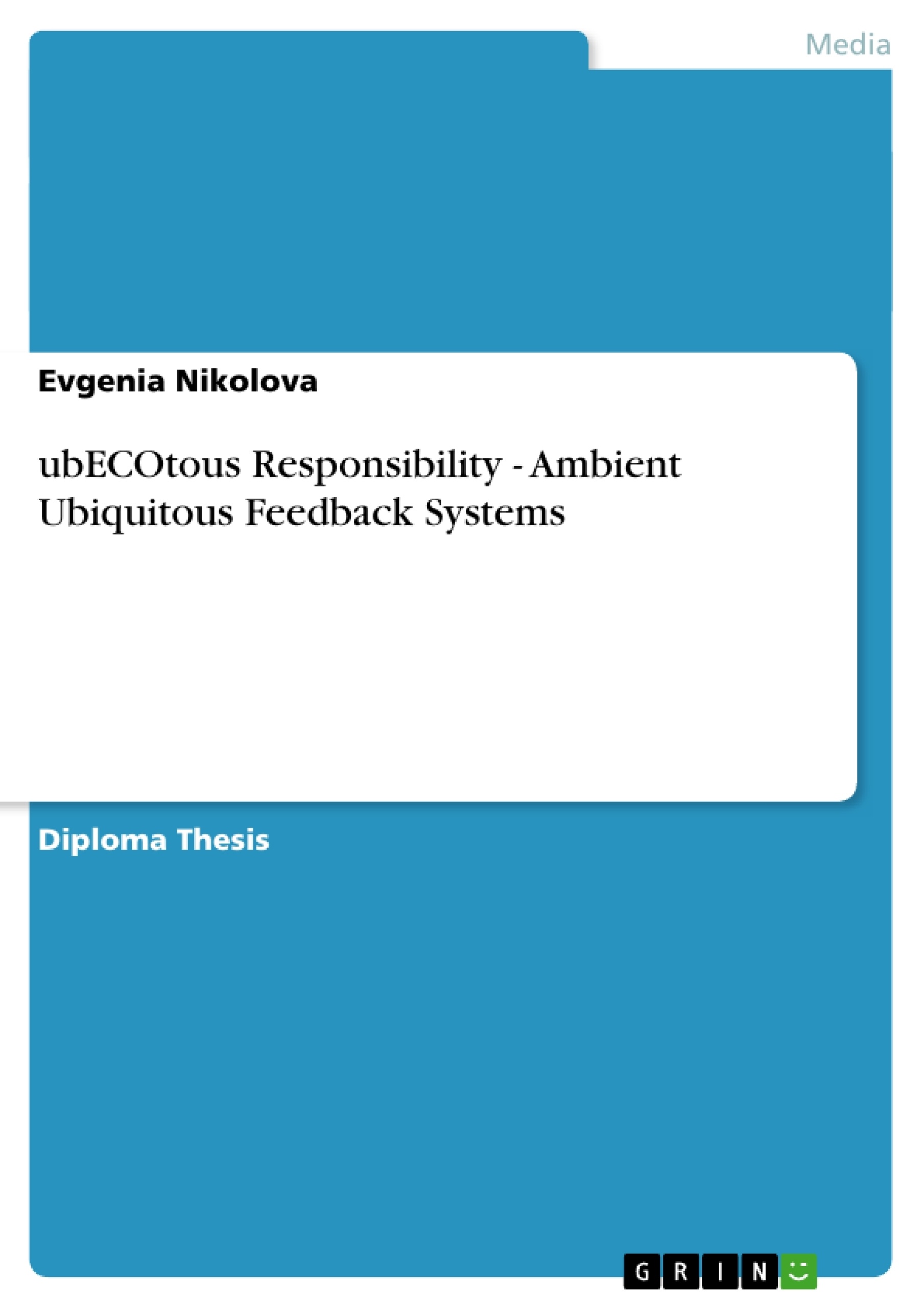This thesis deals with a broad spectrum of topics and scientific areas, such as environmental studies, ecology, health research, sustainability, psychology, technology, and design, among others. It presents a feasability study with recommendations, addressing both technical and design issues, for ubiquitous feedback systems, including an in-depth analysis of building blocks for such systems.
The theory encouraging the creation of systems for displaying real-time resource consumption is that such systems are effective at reducing resource consumption and stimulating the interest of building occupants.
Personal and institutional choices have the potential to substantially reduce resource use in buildings. However, it may be difficult to motivate inhabitants to make decisions that conserve resources for future generations if they cannot easily and immediately observe the consequences of these decisions. Feedback on resource use has the potential to increase both awareness and motivation to act in ways that minimize resource use.
The goal of this thesis is to present an in-depth research of a variety of options for a data monitoring and display system that enables easy observation and interpretation of electricity, water, gas, and oil use within buildings, since the built environment is responsible for a large portion of the overall energy consumption.
The beginning of the thesis will focus on the rationale for developing systems for displaying data on resource use to building users. Then, the technical aspects of developing, designing, and testing data monitoring and display systems will be discussed. Besides, the social implications of installing such systems and the behavioral-psychological issues involved in occupants’ behavior in relation to the feedback will be investigated.
Inhaltsverzeichnis (Table of Contents)
- 1. Introduction
- 2. Rationale for developing a feedback system
- 2.1. Environmental effects of resource overconsumption
- 2.2. Health benefits of reducing consumption
- 3. Conditions for success of the system
- 3.1. Appropriate location
- 3.2. Emotional incentives.
- 3.3. Effectiveness of real-time feedback
- 3.4. Edutainment's appeal
- 4. Technological requirements
- 4.1 Sensors
- 4.1.1. Electricity sensors
- 4.1.2. Water sensors
- 4.1.2.1. Mechanical meters
- 4.1.2.2. Digital meters
- 4.1.2.3. Methods of receiving the reading
- 4.1.2.4. Monitoring consumption
- 4.1.3. Gas meters
- 4.1.4. Oil meters
- 4.2. Displays
- 4.2.1. Comparison of technologies
- 4.2.2. Form Factors
- 4.2.3. Ambient Displays
- 5. The System
- 5.1 Motivation
- 5.2. Design
- 5.2.1. Digital and multimedia design
- 5.2.2. Ambient feedback display design
- 5.2.3. Redesigning the electricity meter
- 5.2.4. Redesigning the water meter
- 5.3 Requirement Analysis
- 5.4. Building Blocks
- 5.4.1. Sensors
- 5.4.2. Data Loggers
- 5.4.3. Displays
- 5.5. Possible setups, interfaces, functions
- 5.6. Personalization and privacy
- 5.7. Evaluation
Zielsetzung und Themenschwerpunkte (Objectives and Key Themes)
This thesis explores the feasibility of ubiquitous feedback systems for resource consumption control, aiming to provide recommendations for technical and design aspects. It delves into the environmental and health benefits of reducing resource consumption, the conditions necessary for the system's success, and the technological requirements involved. The thesis emphasizes the importance of promoting awareness and motivation among building occupants to reduce resource use.
- Environmental impact of resource consumption
- Health benefits of resource conservation
- Technological considerations for data monitoring and display systems
- Social and behavioral implications of feedback systems
- Design recommendations for effective ubiquitous feedback systems
Zusammenfassung der Kapitel (Chapter Summaries)
The first chapter introduces the concept of ubiquitous feedback systems for resource consumption control and outlines the scope of the thesis. Chapter 2 presents the rationale behind developing such systems, highlighting the environmental consequences of resource overconsumption and the health benefits associated with resource conservation. Chapter 3 explores conditions crucial for the success of the system, including appropriate location, emotional incentives, the effectiveness of real-time feedback, and the appeal of edutainment. The technological requirements for the system are discussed in Chapter 4, covering sensors for different resources and different display technologies. Chapter 5 focuses on the system itself, exploring its motivation, design considerations, and potential setups. It also delves into personalization, privacy, and evaluation aspects of the system.
Schlüsselwörter (Keywords)
Ubiquitous feedback systems, resource consumption control, environmental sustainability, health benefits, data monitoring, display technologies, user behavior, design recommendations.
Frequently Asked Questions
What are Ubiquitous Feedback Systems?
These are real-time monitoring systems that display resource consumption (electricity, water, gas) to encourage sustainable behavior among occupants.
How can feedback systems help reduce energy use?
By making consumption visible and immediate, they increase awareness and motivate users to make conservation-oriented decisions.
What are "Ambient Displays" in this context?
Ambient displays provide information in the background of the environment, often using light or color to subtly signal consumption levels without being intrusive.
What technological components are needed for these systems?
The system requires sensors (digital or mechanical meters), data loggers for recording, and visual displays for user interaction.
Are there privacy concerns with ubiquitous monitoring?
Yes, the thesis addresses the importance of personalization and privacy when installing data monitoring systems in private or institutional buildings.
- Quote paper
- Evgenia Nikolova (Author), 2008, ubECOtous Responsibility - Ambient Ubiquitous Feedback Systems, Munich, GRIN Verlag, https://www.grin.com/document/88725



